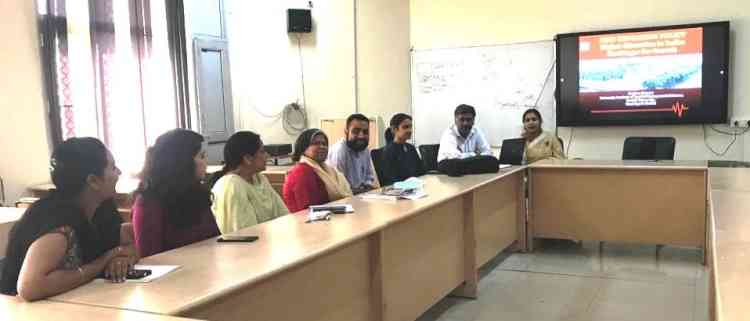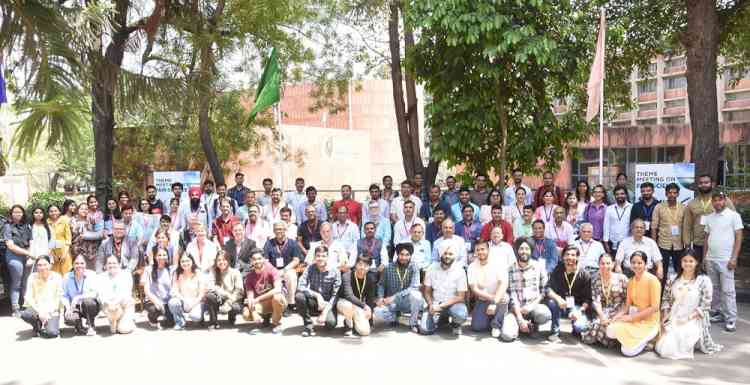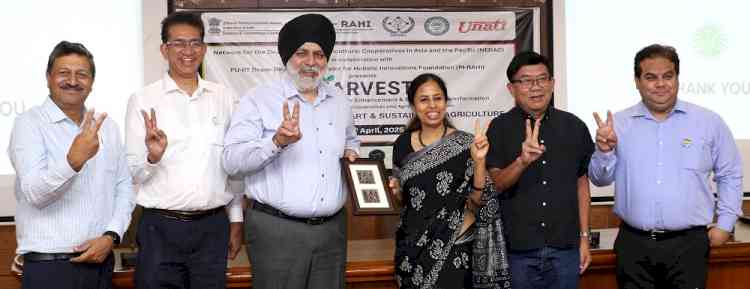Developing strategies for implementation of new education policy
UIAMS organised a brainstorming session to develop operational strategies for fructifying the salient features of the New Education policy

Chandigarh, March 30, 2022: UIAMS organised a brainstorming session to develop operational strategies for fructifying the salient features of the New Education policy wherein faculty and research scholars shared their views. It was noted that the NEP 2020 is the first education policy of the 21st century and replaces the thirty-six year old National Policy on Education (NPE), 1986.
Built on the foundational pillars of Access, Equity, Quality, Affordability and Accountability, this policy is aligned to the 2030 Agenda for Sustainable Development. It is indeed very revolutionary as it aims to transform India into a vibrant knowledge society and global knowledge superpower by making education more holistic, flexible, multidisciplinary, suited to 21st century needs and aimed at bringing out the unique capabilities of each student.
Faculty noted that the policy envisages broad based, multi-disciplinary, holistic education with flexible curricula, creative combinations of subjects, integration of vocational education and multiple entry and exit points with appropriate certification. An Academic Bank of Credit is to be established for digitally storing academic credits earned from different HEIs so that these can be transferred and counted towards final degree earned. Under NEP 2020, a gender-responsive educational curriculum has been proposed which will reverse gender bias and discrimination within the educational system and society.
Multidisciplinary Education and Research Universities (MERUs), at par with IITs, IIMs, to be set up as models of best multidisciplinary education of global standards in the country. The National Research Foundation will be created as an apex body for fostering a strong research culture and building research capacity across higher education.
The interactive session was organised under the guidance of Prof Raj Kumar, Vice Chance;llor , PU who has been making efforts to make PU focus on research and innovation as key pillars of its competencies. He has mandated all departments to conduct awareness sessions and develop a future roadmap for successful implementation of NEP. Under his leadership, PU has been comducting frequent SDPs and FDPs on this theme since 2020.
Prof Nishi Sharma, Director UIAMS noted that successful implementation of NEP requires a transformation of traditional methods of teaching, learning discourse, and resources. UIAMS is ideally poised to implement it as there is tremendous flexibility inbuilt in the system and faculty has been undertaking pioneering work. Syllabus of UIAMS is already in line with the sectoral requirements to enhance employability quotient of students and is being revisited every three years.
The ideals, spirit and essence of NEP 2020 should not be lost in unnecessary hurdles or minute details but facilitative in nature to maintain the standard of higher education, all the universities irrespective of whether it is state or centre university should be governed by same rules and regulations and if there is a hindrance in the uniform implementation of the state due to meagre resources/ financial etc., that can be compensated with centre aid.
Prof. Sanjeev Kumar Sharma noted that P.U. has been successful in creating 7 different verticals and integrating science labs: This has led to their enhanced utilization and enhanced revenue, lower maintenance costs It was further noted that a National Higher Education Qualification Framework (NHEQF) can help for Effective implementation of CBCS system/ multidisciplinary courses along with renewed Focus on Blended learning, by integrating E-learning and M-learning into the traditional mode. There is a need for focus on assessment and accreditation as per the global standards as our students have a global playing field. Uniform National Grading system for certificate, degree and diploma courses can enhance placement of PU students.


 cityairnews
cityairnews 









